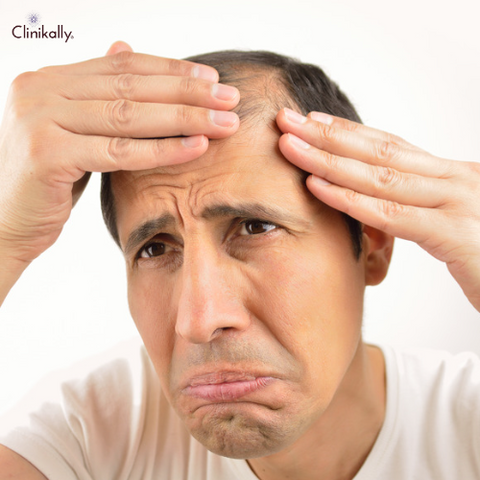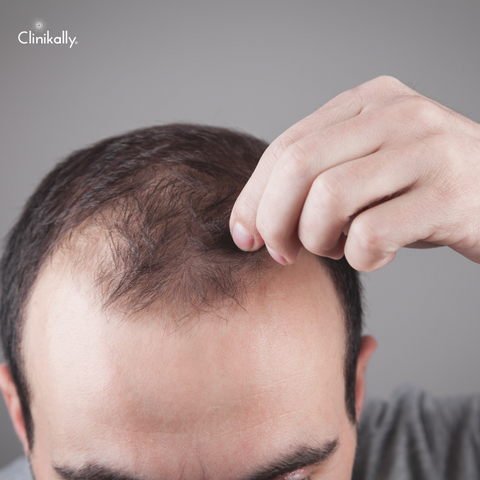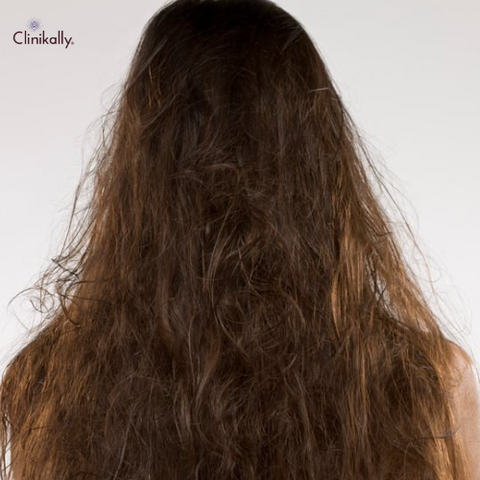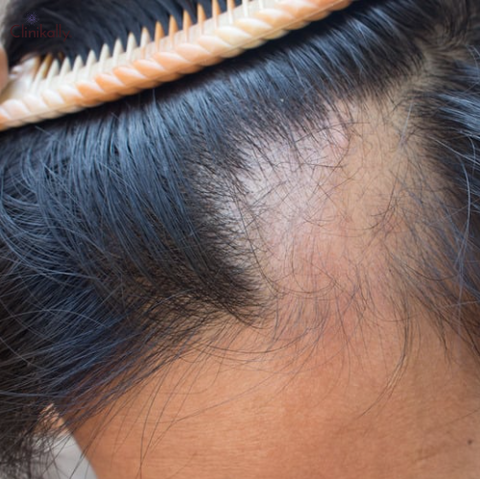Essential oils like cinnamon and clove oil frequently include the natural substance eugenol. It is renowned for its pleasant scent, analgesic, and antibacterial qualities. Interest in the possible advantages of eugenol for hair health has recently increased. Here is a summary of research on the effectiveness of eugenol for thicker hair:
-
Promotes hair growth: According to a study published in the Journal of Applied Cosmetology, eugenol can stimulate hair growth by increasing blood circulation to the scalp. Eugenol has been shown in the study to help with thickening and strengthening hair.
-
Reduces hair loss: A study in the International Journal of Trichology discovered that eugenol can aid in reducing hair loss by obstructing the activity of an enzyme known as 5-alpha-reductase. This enzyme is in charge of turning testosterone into the hormone dihydrotestosterone (DHT), which can cause hair loss.
-
Controls dandruff: Eugenol is effective at reducing dandruff because it has antifungal and antiseptic properties. According to a study published in the Journal of Essential Oil Research, eugenol can effectively control the growth of Malassezia furfur, a yeast that can cause dandruff.
-
Protects against oxidative stress: Strong antioxidants like eugenol can help protect hair from oxidative damage brought on by free radicals. Eugenol is a powerful free radical scavenger and can reduce lipid peroxidation, which can harm and break the hair, according to a study published in the Journal of Natural Products.
Eugenol, a naturally occurring substance, has a variety of potential advantages for the health of your hair. It can manage dandruff, stop hair loss, encourage hair growth, and shield hair from oxidative stress. These studies indicate that eugenol might be a potent ingredient to include in hair care products, though more research is required to fully understand its effects on hair health.
What is Eugenol and How Does it Strengthen Hair?

Eugenol is a natural compound found in various plants, including clove, cinnamon, and basil. It is known for its antiseptic, analgesic, and anti-inflammatory properties, and has been used for centuries in traditional medicine. In recent years, eugenol has gained attention for its potential benefits in hair care. There are several ways that eugenol can thicken hair:
-
Promoting hair growth: Eugenol can increase blood flow to the scalp, which encourages the creation of new hair. It has also been demonstrated to strengthen and thicken hair.
-
Reducing hair loss: Eugenol can inhibit the activity of an enzyme called 5-alpha-reductase, which converts testosterone into dihydrotestosterone (DHT), a hormone that can contribute to hair loss.
-
Controlling dandruff: Eugenol has antifungal and antiseptic properties that make it useful for dandruff control. It can help control the growth of Malassezia furfur, a yeast that can cause dandruff.
-
Antioxidant protection: Strong antioxidants like eugenol can help shield hair from the oxidative damage brought on by free radicals. This can help prevent hair breakage and damage.
By promoting hair growth, reducing hair loss, controlling dandruff, and protecting against oxidative stress, eugenol can improve the strength of hair as well as its overall health and appearance. To provide these advantages, eugenol is frequently added to hair care products such as shampoos, conditioners, and hair masks.
Eugenol as a Natural Ingredient for Hair Growth and Thickness
The natural component of eugenol can aid in promoting thicker, longer hair. This substance, which is renowned for having antibacterial, analgesic, and anti-inflammatory qualities, may be found in many plants, including clove, cinnamon, and basil. Eugenol can promote hair thickness and growth in the following ways:
-
Stimulating blood circulation: Eugenol can improve blood circulation in the scalp, resulting in increased nutrient and oxygen supply to hair follicles. This increased circulation can aid in hair growth and promote thicker hair.
-
Inhibiting 5-alpha-reductase: Eugenol can inhibit the activity of an enzyme called 5-alpha-reductase, which converts testosterone into dihydrotestosterone (DHT). DHT is a hormone that can cause hair thinning and loss. Eugenol promotes thicker hair by inhibiting 5-alpha-reductase, which helps stop DHT-related hair loss.
-
Controlling inflammation: Scalp inflammation can disrupt the hair growth cycle and contribute to hair loss. Eugenol has anti-inflammatory properties that can aid in the reduction of scalp inflammation, resulting in healthier hair growth and increased thickness.
-
Fighting free radicals: Eugenol is a powerful antioxidant that can help protect hair follicles from free radicals, which can cause damage and weakening. Eugenol, by combating free radicals, eugenol can promote healthy hair growth and thickness.
Including eugenol in your hair care routine may aid in hair growth and thickness. To reap the benefits of this natural ingredient, look for shampoos, conditioners, and hair masks containing it.
Eugenol and Its Effects on Hair Volume and Scalp Health
A natural substance called eugenol, which is present in plants including basil, cinnamon, and cloves, has been investigated for its impact on hair volume and scalp health. The following are some potential advantages of eugenol for healthy hair and scalp:
-
Eugenol has been shown to improve blood flow to the scalp, which can encourage thicker, healthier hair growth. With better circulation, the hair follicles acquire more nutrients and oxygen, which results in thicker, healthier hair.
-
Dihydrotestosterone (DHT) is a hormone that promotes hair thinning and loss. Eugenol has been shown to inhibit the activity of 5-alpha-reductase, an enzyme that converts testosterone to DHT. Eugenol can help prevent hair loss and thinning by lowering DHT levels, resulting in increased hair volume.
-
Inflammation of the scalp can disrupt the hair growth cycle and contribute to hair loss. Eugenol has anti-inflammatory properties that can aid in the reduction of scalp inflammation and the improvement of scalp health, resulting in increased hair volume.
-
Eugenol is a powerful antioxidant that can protect hair from free radical damage, which can cause hair to weaken and contribute to hair loss. By providing antioxidant protection, eugenol can help maintain scalp and hair health, resulting in increased hair volume.
Eugenol may improve the condition of the scalp and hair volume. Including eugenol-rich hair care products in your regimen, like cinnamon extract or clove oil, may encourage healthy hair development and boost hair volume. As with any hair care product, it's crucial to conduct a patch test prior to use and adhere to the suggested usage instructions.
The Potential Benefits of Eugenol for Hair Repair and Damage Prevention

Eugenol, a natural substance present in plants like basil, cinnamon, and cloves, may also help heal damaged hair and shield it from further harm. The following are some possible advantages of eugenol for hair regeneration and damage avoidance:
-
Moisturizes hair: The moisturizing qualities of eugenol can aid in hydrating and nourishing dry, damaged hair. Reducing breakage and increasing hair suppleness, can produce stronger, healthier hair.
-
UV protection: Eugenol has been discovered to have some UV-absorbing properties, which can help protect hair from sun damage. UV radiation can cause hair to become brittle and break, so sun protection is essential for preventing damage.
-
Strengthens hair: Eugenol can help strengthen hair by binding to the protein structure of the hair and improving hair elasticity. This can help prevent breakage and damage, resulting in healthier, stronger hair.
-
Anti-fungal properties: Eugenol has antifungal properties that can help prevent scalp conditions like dandruff, which can contribute to hair damage and hair loss.
Eugenol may help restore damaged hair and shield it from further harm. Including eugenol-rich hair care products in your routine, like cinnamon extract or clove oil, may help your hair stay healthier and avoid damage. As with any hair care product, it's crucial to conduct a patch test prior to use and adhere to the suggested usage instructions.
Eugenol and Its Role in Repairing Damaged Hair Follicles and Promoting Hair Texture
Eugenol, a natural substance present in plants like basil, cinnamon, and cloves, may also help to restore damaged hair follicles and improve the texture of hair. The following are some potential advantages of eugenol for restoring hair follicles and enhancing texture:
-
Eugenol has been found to promote the proliferation of hair follicle cells, which in turn stimulates hair growth. This can encourage the growth of healthy hair and repair damaged hair follicles.
-
Eugenol is a strong antioxidant that can shield hair from free radical damage, which can result in hair damage and loss. By providing antioxidant protection, eugenol can help maintain scalp and hair health, resulting in improved hair texture.
-
Inflammation in the scalp can interfere with the cycle of hair growth and cause hair loss, so anti-inflammatory properties are important. The anti-inflammatory properties of eugenol can help lessen scalp inflammation and enhance scalp health, which will enhance the texture of your hair.
-
Eugenol has been shown to improve blood circulation in the scalp, which can promote healthy hair growth and improve hair texture. With better circulation, the hair follicles receive more nutrients and oxygen, resulting in healthier, stronger hair.
Eugenol may help restore damaged hair follicles and improve the texture of the hair. Eugenol-rich hair care products, such as cinnamon extract or clove oil, may assist in enhancing the health and texture of your hair. As with any hair care product, it's crucial to conduct a patch test prior to use and adhere to the suggested usage instructions.
Eugenol and Its Potential as a Natural Alternative to Chemical Hair Products
The natural substance eugenol, which is present in plants like basil, cinnamon, and cloves, has the potential to serve as a healthy substitute for chemical hair products. Eugenol might be an excellent natural alternative for hair care for the following reasons:
-
Non-toxic: The natural ingredient eugenol is generally regarded as safe for use in hair care products. Eugenol is a natural substitute that is risk-free and environmentally benign, unlike other artificial chemicals that can be hazardous or damaging to the environment.
-
Nourishing properties: Eugenol possesses hydrating and nourishing qualities that can help moisturize and strengthen hair, improving the health and texture of that hair in the process. As a result, it may be a decent substitute for chemical additives that can dry out and damage hair by robbing it of its natural oils.
-
Anti-inflammatory properties: As a natural anti-inflammatory, eugenol can help lessen scalp irritation, which can cause hair loss and damage. As a result, it might be a useful substitute for chemical compounds that might irritate the scalp and cause inflammation.
-
Environmentally friendly: Because eugenol is a naturally occurring compound, it is generally regarded as environmentally friendly. It is biodegradable and does not pollute the environment in the same way that certain chemical ingredients do.
Eugenol may one day serve as a safe, organic substitute for chemical hair products. The health and structure of your hair may be improved by incorporating eugenol-rich substances into your hair care regimen, such as clove oil or cinnamon extract, while avoiding the possible hazards associated with chemical additives. As with any hair care product, it's crucial to conduct a patch test prior to use and adhere to the suggested usage instructions.
Understanding the Safety and Efficacy of Eugenol in Hair Care Products

When used in the right amounts, eugenol is generally regarded as safe for use in hair care products. But there are potential hazards and things to think about, just as with any ingredient. The following points should be taken into account when using eugenol in hair care products:
-
Sensitivity and allergies: Some people may be sensitive or allergic to eugenol, especially if it is used in high concentrations. Before using eugenol-containing hair care products, a patch test should be performed to rule out any allergic reactions or sensitivity.
-
Irritation: Eugenol can irritate the eyes and mucous membranes if used in high concentrations or if it comes into contact with them. Avoid getting the product in your eyes or other sensitive areas by adhering to the suggested usage instructions.
-
Concentration: Eugenol is frequently used in hair care products at low concentrations to prevent irritability and possible allergic reactions. It's important to adhere to usage recommendations and not go over the recommended concentration limits.
-
Efficacy: Eugenol may improve the health and texture of hair, but results will depend on the user and the formulation of the product. Look for hair care products that contain eugenol in concentrations that have been shown in clinical studies to be effective.
When used in the right amounts, eugenol is generally regarded as safe for use in hair care products. Eugenol may improve the health and texture of hair, but there may also be hazards and repercussions when using it in hair care products. As with any hair care product, it's crucial to follow the stated usage instructions and stop using it if any unfavourable side effects appear.
Research on Eugenol and Its Effects on Hair Health and Safety
Numerous investigations of eugenol's impacts on hair safety and health have been made. The research's main conclusions are as follows:
-
Hair growth: According to a study that appeared in the Journal of Medical Plant Research, eugenol promoted mice's hair growth when combined with other natural substances. The study's findings suggest that eugenol may have value as a complementary therapy for hair loss.
-
Effects on inflammation: Eugenol has been demonstrated to have anti-inflammatory properties, which may help lessen scalp inflammation and enhance the health of hair. According to a study in the International Journal of Cosmetic Science, topical application of eugenol to the skin significantly reduced inflammation.
-
Antioxidant effects: Eugenol has antioxidant properties that may help protect hair from oxidative damage caused by free radicals. In vitro, testing revealed eugenol to have significant antioxidant activity, according to a study in the Journal of Medicinal Food.
-
Safety: Eugenol is generally considered safe for use in hair care products when used in appropriate concentrations. According to research published in the International Journal of Toxicology, eugenol was neither a skin irritant nor a skin sensitizer at concentrations up to 5%.
According to a study, eugenol may help maintain healthy hair by promoting hair growth, acting as an anti-inflammatory, and having antioxidant characteristics. If used in the right concentrations, it is typically regarded as safe for use in hair care products. The suggested usage instructions must be followed, and a patch test should be performed to check for any allergic reactions or sensitivities.
The Importance of Ingredient Safety and Product Formulation in Hair Care
In terms of hair care, ingredient safety and product composition are crucial considerations. Hair care products come into contact with the skin, scalp, and hair directly; if ingested, they may have systemic effects. In order to minimize potential hazards, it is crucial to develop hair care solutions using safe and efficient components. Several important factors for component safety and product formulation in hair care are listed below:
-
Ingredient safety: Skin and scalp-safe ingredients should be used in the formulation of hair care products. This includes staying away from substances that are poisonous, allergenic, or irritants. It is also important to use ingredients that have been thoroughly tested for safety and efficacy and to avoid using ingredients that are banned or restricted in some countries.
-
Product efficacy: Hair care products should contain ingredients that have been shown to improve hair health and appearance. This includes ingredients that help strengthen and nourish hair, improve texture and volume, and protect against environmental stressors.
-
Formulation: The safety and effectiveness of hair care products should be maximized throughout the formulation process. Maintaining the stability and security of the product includes employing the proper concentrations of active chemicals, pH-balancing agents, and preservatives. The use of elements that can adversely affect one another or the packaging components must also be avoided.
-
Labelling: The components in hair care products should be listed completely on the label, together with usage directions and any necessary warnings or precautions. This enables customers to choose items wisely and steer clear of any potential hazards or negative effects.
Manufacturers can guarantee that their hair care products are both safe and effective for consumers to use by using safe and effective ingredients, formulating products appropriately, and accurately labelling products.
Incorporating Eugenol into Your Hair Care Routine

Here are some suggestions if you want to use eugenol in your hair care regimen:
-
Look for eugenol-containing hair care products: Shampoos, conditioners, and hair treatments are a few examples of products that contain eugenol. Choose products with natural ingredients instead of those with harsh chemicals or artificial fragrances.
-
DIY hair treatments: You can also create your own DIY eugenol-based hair treatments. For example, you can apply eugenol essential oil to your scalp and hair by combining it with a carrier oil such as coconut oil. Leave the treatment on for 30 minutes to an hour before rinsing with warm water and shampooing as usual.
-
Use essential oils with caution: Essential oils, including eugenol, should be used with caution because they can be potent and cause skin irritation or allergic reactions in some people. Always dilute essential oils with a carrier oil before applying them to your skin or scalp, and perform a patch test before the first time you use them.
-
Follow the recommended usage guidelines: When using eugenol-containing hair care products, make sure to follow the recommended usage guidelines. Overuse of eugenol-containing products or any other ingredient can cause scalp irritation or hair damage.
-
Be patient: It may take some time to see results from using eugenol in your hair care routine. Allow the eugenol to work its magic by being patient and consistent with your routine.
Eugenol may strengthen hair, encourage hair growth, and enhance scalp health when used in hair care regimens. Just make sure to use it responsibly and in accordance with the suggested usage rules.
The Best Ways to Use Eugenol for Stronger and Healthier Hair
The following are some of the finest applications for eugenol for thicker, healthier hair:
-
Use hair care products containing eugenol: Look for eugenol as an active ingredient in shampoos, conditioners, and hair treatments. These products may help to strengthen and nourish your hair, improve texture and volume, and protect against environmental damage.
-
Use eugenol essential oil in a carrier oil: Eugenol essential oil can be applied directly to your scalp and hair after being diluted with a carrier oil such as coconut or jojoba oil. Massage the oil into your scalp for at least 30 minutes before shampooing as usual. This may benefit scalp health, hair follicle strength, and hair growth.
-
Make a DIY hair mask with eugenol: You can also make a DIY hair mask with eugenol essential oil. Apply eugenol essential oil to your hair along with other nourishing ingredients such as honey, yogurt, or avocado. Leave the mask on for 30 minutes before rinsing with warm water and shampooing as usual.
-
Use eugenol with caution: Eugenol is a potent essential oil that should be used with caution. Always dilute eugenol with carrier oil before applying it to your scalp or hair. Make sure you don't experience any allergic reactions by testing the diluted eugenol on a small patch of skin first.
-
Be consistent: It may take several applications of eugenol to reap the full benefits. For the best results, incorporate eugenol into your hair care routine on a regular basis.
Eugenol may be a helpful element for hair that is stronger and healthier. Use eugenol carefully and consistently for the best results, whether you use commercial hair care products or create your own DIY treatments.
Common Hair Care Products that Contain Eugenol and Alternatives to Consider
The potential advantages of eugenol for the health of hair make it a popular ingredient in hair care products. Consider the following examples of typical hair care products that might contain eugenol and their substitutes:
-
Shampoos and conditioners: Look for products with clove oil or clove extract, which are natural sources of eugenol. If you prefer not to use eugenol, look for products that contain other natural ingredients like tea tree oil, lavender oil, or chamomile extract.
-
Hair Masks: Many hair masks contain eugenol-containing ingredients, such as clove oil or cinnamon oil, to help strengthen and nourish hair. If you don't want to use eugenol, look for a hair mask that contains other natural ingredients, such as argan oil, honey, or coconut oil.
-
Scalp Treatments: Eugenol can be used in scalp treatments to promote hair growth and improve scalp health. Look for treatments that combine eugenol with other beneficial ingredients like biotin, keratin, or vitamin E. If you don't want to use eugenol, look into scalp treatments that contain other natural ingredients like peppermint oil, aloe vera, or rosemary extract.
-
Hair Styling Products: Eugenol can be found in hair styling products such as gels, mousses, and sprays. If you want to avoid eugenol, look for styling products that contain natural ingredients like beeswax, shea butter, or jojoba oil.
However, not everyone may benefit from eugenol as a component in hair care products. Before using goods containing eugenol, take other natural substances into account or speak with a dermatologist if you have sensitive skin or are apprehensive about using it.
Final Thoughts: The Potential of Eugenol for Stronger and More Beautiful Hair

Stronger, healthier, and more attractive hair can be encouraged naturally with eugenol, which has demonstrated remarkable potential in this regard. It is a common ingredient in hair care products since it can aid in repairing damaged hair, encouraging hair growth, and enhancing scalp health. Eugenol is usually thought to be safe, however, it's crucial to remember that not everyone should use it. Eugenol may cause an allergic reaction in those with sensitive skin; hence, it is always advised to patch-test new hair care products before using them. Eugenol-containing hair care products can help you get hair that is stronger, healthier, and more attractive. But it's crucial to pick products that use eugenol in dosages that are safe and efficient and to constantly adhere to product guidelines. Be patient and give eugenol some time to work its magic; like with any hair care product, consistency is crucial.
































